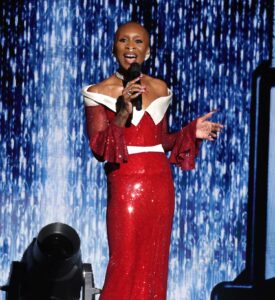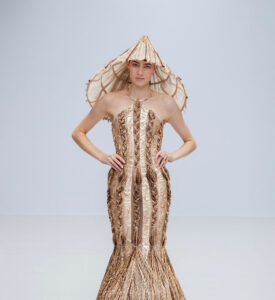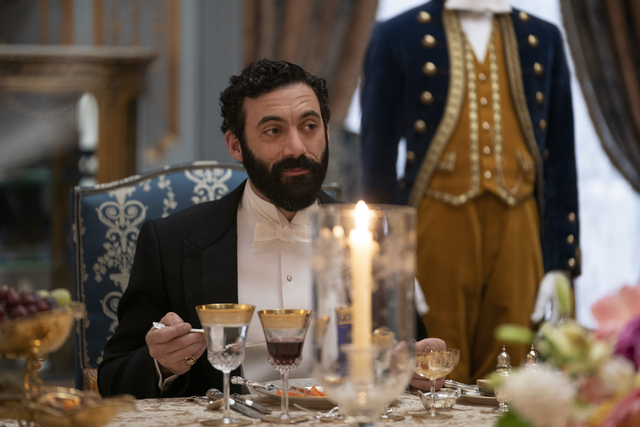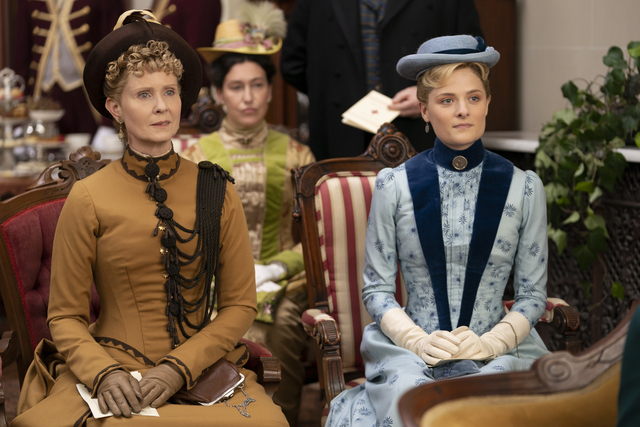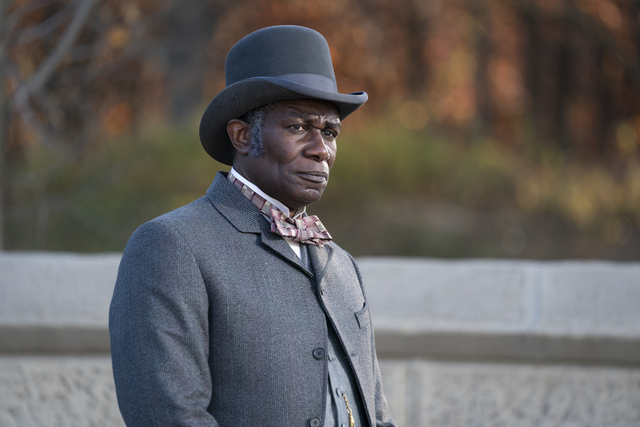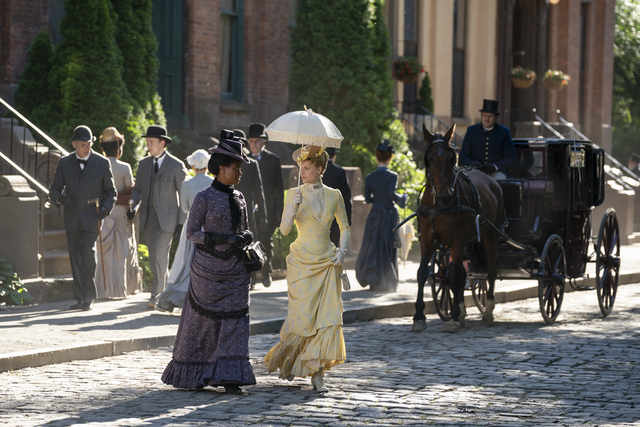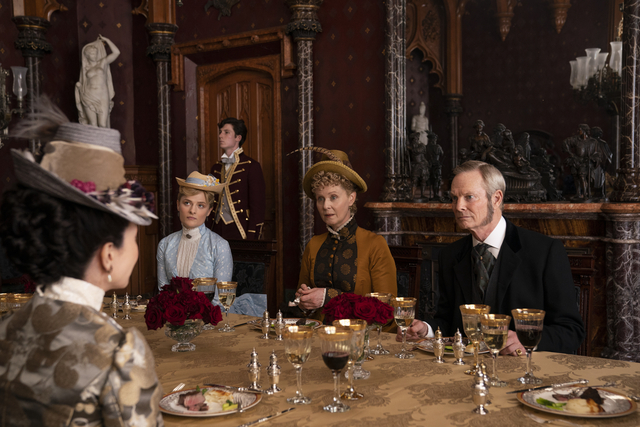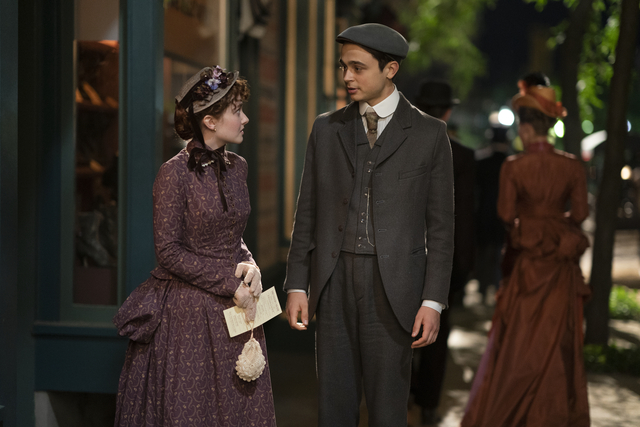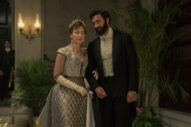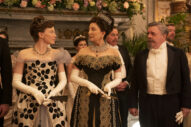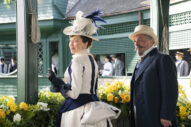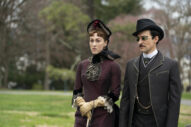As a heads-up before we get started, this recap will (briefly) discuss a death by suicide.
This week on Rich People With Problems….some rich people have some extremely bad problems, several of which are of their own making. Do not underestimate how much of a Wife Guy George Russell is. You were mean to Bertha? He will ruin you! And I don’t mean that hyperbolically! You will be literally financially ruined by him.
Also on tap: Whom To Marry continues to be a hot topic, as it has throughout all of recorded history; and Peggy is (a) dealing with frustrations with her father; (b) dealing with racist readers curtailing her career; and (c) no closer to revealing Her Big Secret to us.
Let’s dive into the lives of the Upper East Siders:
THE VAN RHIJN/BROOKS FAMILY:
Marian kicks off the genesis of Ada and Agnes’s main story this week by announcing that Aurora Fane has started yet another charity. I wrote in my notes that what Aurora really needs to keep her busy and satisfying is A JOB but, uh, the events of this episode may mean that she will also possibly need one for money. “Do you know a woman named Clara Barton?” Marion asks The Aunts one morning, and I can’t wait until this show is completely a fancy Forrest Gump, just a Child of Streep meeting Famous Ladies of History over and over again every week. I can see it now: “That small child is…ELEANOR ROOSEVELT.” (Seriously, though, Eleanor Roosevelt is definitely the distant cousin of someone in here. Mrs Astor’s oldest daughter is married to Tadd Roosevelt, who is FDR’s uncle and FDR and ER are distant cousins. I’ll make that flowchart later.)
Anyway, Ada and Marian go over to Aurona Fane’s house where Clara Barton (Linda Emond, three Tony nominations) is like, “The Red Cross! A good idea,” and Mrs Astor asks some pointed questions about presidential support that lets the script include some coy stuff about President Arthur that genteelly does not mention that Arthur is only president because Garfield was assassinated, and it puts all this mansplaining into the mouth of one Cornelius Eckhart III.
And we go on AN EMOTIONAL RIDE with Cornelius Eckhart III, who is (a) not a real person, and (b) played by Bill Irwin who yes of course does have a Tony. (He won for Who’s Afraid of Virginia Woolf in 2005, and has four other nominations.) He’s a friend/suitor of Ada’s from her youth and it totally seems like he’s BACK to get things rolling with her romantically again and everyone is into this (including me, Marion, Ada herself [in her fluttery way] and all the ladies at the Red Cross Luncheon, who are basically like “ooooOOOOOoooooh” when he asks if he can call on her and Agnes). Guess who is not into this? Agnes. And guess who is CORRECT AGAIN? Agnes, who gets Cornelius alone and tells him that if Ada gets married, she’s out of the house and off the payroll. She then adds that the reason her father didn’t let Cornelius marry Ada the first time around is because he’d been heard “boasting in a bar that he was about to marry a meal ticket. You were wrong about that too.” And so then he LEAVES. He WAS after her money! (Agnes feels bad about this, clearly, as she lets Ada pick out their menus for the next day and tells her to choose her favorites.) Listen, Agnes can read a person, which is why I’m not totally convinced she’s wrong about Upstart Lawyer Tom Raikes, whom she calls “an adventurer,” and it’s not a compliment…
…although Tom Raikes who is — NO DUH — moving to New York, would disagree that it’s a bad thing. Against her (mild) protestations, Tom talks Marian into meeting him to see “the proposed” Statue of Liberty’s hand, which is just hanging out in Madison Square Park as an incitement to raise money for Lady Liberty, who is not up yet. The hand is neat. It’s the torch hand, obviously, not the Statue of Liberty’s random other hand holding the tablet that you have never thought about until just now. The funding of and building of the Statue of Liberty is FASCINATING and logistically complex and I honestly think it would never happen today. This is a bit from its Wiki:
Joseph Pulitzer, publisher of the New York World, a New York newspaper, announced a drive to raise $100,000—the equivalent of $2.3 million today. Pulitzer pledged to print the name of every contributor, no matter how small the amount given. The drive captured the imagination of New Yorkers, especially when Pulitzer began publishing the notes he received from contributors. “A young girl alone in the world” donated “60 cents, the result of self denial.” One donor gave “five cents as a poor office boy’s mite toward the Pedestal Fund.” A group of children sent a dollar as “the money we saved to go to the circus with.” Another dollar was given by a “lonely and very aged woman.” Residents of a home for alcoholics in New York’s rival city of Brooklyn—the cities would not merge until 1898—donated $15; other drinkers helped out through donation boxes in bars and saloons. A kindergarten class in Davenport, Iowa, mailed the World a gift of $1.35. As the donations flooded in, the committee resumed work on the pedestal. France raised about $250,000 to build the statue while America had to raise up to $300,000 to build the pedestal.
(Pulitzer himself is VERY interesting and his whole life could be a limited series. He might show up here eventually?) Anyway, while they’re walking around the hand (and Peggy and her cute purse watches with interest from a bench), he makes his case to Marian as a suitor with a good job and excellent prospects. He also says “there is no man living who cares for you more than I.” I was like, “really?!?” Marian seems into it, although she does point out that he barely knows her. Do we think he is a fortune hunter? I kinda think he likes her AND he’s a fortune hunter who wants to get this locked down ASAP. Anyway, Marian tells Peggy that he proposed (which I guess he sort of did although the Will You Marry Me? bit wasn’t said). “You didn’t tell him no?” Peggy says. “I didn’t tell him anything,” Marian says. “But you didn’t tell him NO,” Peggy says. She is 40% delighted, because it’s fun when your friends get proposed to, 10% surprised Marian didn’t say no when Agnes has already told her not to see Tom, and 50% loving the gossip regardless. I love Peggy and her scenes with Marian continue to be the most natural that Louisa Jacobson is with anyone, although she is doing her level best.
Finally, we’ve got Oscar and Oscar is in a mess but this mess works itself out at the end — although he might not be aware of that yet. Basically, Oscar has decided he’s going to marry Gladys Russell for all the reasons we’ve speculated: She’s super rich (he must have money, he says like 100 million times, we get it!), she’s “very innocent” and will never catch on to the fact that he’s in a full relationship with John Q Adams (who has a great dressing gown and actually might live with him?), and also she “seems nice.” He thinks they’ll be happy! This ignores the fact that Gladys isn’t even out yet and also that Bertha doesn’t want her to marry him, and also that Gladys is sneaking out — with the help of her governess who is also ACTIVELY STEALING BOOZE and is for sure Bad News — to see an “Archie Baldwin” who I assume is related to Alec. (Not really. These Baldwins are meant to be very very fancy.) Oscar tells JQA that they can still keep up their relationship, unless he “really takes to it,” and I can only surmise that the “it” to which he might take is banging his wife. Anyway, poor JQA looks unhappy about this. Maybe you should marry Marian, JQA, and make this whole thing muuuuuuuuch messier.
Speaking of the Russells:
THE RUSSELLS:
Welcome to The Big Short Starring George Russell. Strap in because I’m gonna have to explain some economics and stocks and shit. I actually think the show did pretty well in explaining all this financial stuff without it being too exposition-y, but I still feel like an English teacher who has been asked to sub for Econ. I’ll do my best! Remember last week, when George told Alderman Morris and all his Alderman Friends to pass a law so he can build Penn Station and treat themselves to some insider trading along the way, as a treat? Well, that worked: They passed the law, and the stock price of George Russell Railroads ‘N’ More or whatever it’s called is up. But! Now they PLAN TO RESCIND THE LAW. They made the money and then took away their side of the bargain, the railway station. As you can imagine, George does a lot of yelling in front of fireplaces at Alderman Morris about this:
“In other words, you all bought shares on margin, passed the law, and made a fat profit,” he yells, while flames soar in the background behind him. “Now I imagine you’ve sold them short. And you mean to cancel your own law, betting that the value will plummet. Then you’ll buy them again when they hit rock bottom, and in the process double or triple your ill-gotten gains,” he explains loudly. (I got that, though!) He then vows to ruin them all, and calls Alderman Morris a greedy dirty thief and Morris sort of hems and haws and blahs and blarghs but you know shit has gotten real because he sweeps out of George’s office with a stiff “good day to you, Mr. Russell!”
George does a lot of fretting and scheming about this at home with Bertha and eventually comes up with a plan to thwart everyone — but it comes with a huge financial risk to them and if it doesn’t work, they’re broke. “We’ve made one fortune before. If needs be, we’ll make and spend another,” Bertha tells him, very calmly. Of course, this leads to sex. These two are very well-matched.
So George secretly buys up all his own stock as soon as any of it comes on the market, to keep the price from plummeting, and it works and everyone FREAAAAAAKS out because they’re all going to lose everything if the stock price doesn’t drop they way they planned it to. Both Alderman Morris and Aurora Fane’s husband Charles (who is very handsome and looks like Richard Chamberlain; he is played by Ward Horton and he does not have a Tony yet) go home and yell at their wives that George would never be so vindictive if they hadn’t been such bitches to Bertha, and that is honestly quite true. The Morrises and the Fanes are literally paying for their snobby behavior. So Mrs Morris actually goes to Bertha and asks her to get George to quit this stock-buying scheme and Bertha is like HAHA NICE TRY. (She actually says, “Life is like a bank account, you cannot write a check without first making a deposit,” and then kicks her out of the house. It does take a LOT of cheek to ask Bertha for a favor after having rejected her at every turn.)
Anyway, George is more or less sitting inside his burning fireplace when all the alderman come to him and ask him to pleaaaaase stop ruining them financially! They swear they’ll pass the law now!! Er, again. Morris literally gets on his knees and literally begs, and George is like….well, I guess I sort of feel bad but maybe you should have been nicer to Bertha! Morgan Spector wins the prize of being the actor who says the title of the episode when he notes that he’s very sorry but it looks like they’re going to have to face the music. Listen… maybe don’t try to out-rob a robber baron, you dummies!
And as George goes home and tells Bertha that their plan worked and he’s getting his railroad station after all, Alderman Morris goes home and tells his wife how much he loves her and then goes upstairs and shoots himself in the head. (This is the final shot of the episode.) This is gonna cause….a lot of problems for a lot of people.
THE SCOTTS:
First off, the only movement we get on Peggy’s Mysterious Legal Secrets is that Tom Raikes tells her that he can “confirm [Peggy’s] suspicions!” What are her suspicions!!??!! (My theory is that Peggy was in love with someone unsuitable and her father scared him off, and then her suitor went off and joined the army…although I’m not sure how a lawyer would be involved there. Hmm.)
Second, we finally met Peggy’s father Arthur (played by John Douglas Thompson, who has, yes, a Tony nomination). Here he is:
He looks very jaunty. They meet at the park, and there is a small moment where two white assholes on the sidewalk just stand there and make the Scotts move out of their way instead of going around them, and in my version of this show, those two are both hit by lighting the next day. Peggy and her Dad clearly have a cordial but contentious relationship, where they both think they are owed an apology by the other, and although he acts like he wants to make up and invite Peggy to come to the house for her mother’s birthday, I think he really just wants to smooth everything under the rug. It’s a good scene with the two of them, though: He doesn’t like that she’s living in the servants quarters at the Van Rhijns house, and he also tells her that there are no Black women writers who can make a living wage, neither of which she wants to hear, particularly. “You can always come home and work for me,” he offers, and Peggy really does not want to do that. But she will go home for her mother’s birthday. (Who would miss the opportunity to celebrate Audra McDonald?)
Peggy does tell her father her good news — he is not that impressed — which is that editor of The Christian Advocate (a real paper, which only stopped publishing in the ’70s) wants to publish some of her stories. But when she gets to the paper’s offices to meet him, she’s the only Black person there, and the editor’s secretary is very taken aback by the fact that she’s Black, and makes her wait all day for her meeting. (She smartly reminds him that the paper recently published an editorial about the importance of equal rights, which feels like it’s the only thing that prevented him from asking her to leave. There is a white man there who we never met and who doesn’t say anything but who appears to be taking notes about this exchange, and I wonder if he will show up again later.) Finally, Peggy is taken back to see the editor, and it is a very frustrating meeting for her. First the editor questions whether she really wrote the stories she submitted, because they are so good. (SHE DID; this made me want to fight him.) And then he tells her that he’d like to publish them, and pay her very well, but they need to make some changes to make them “more palatable” to their (Southern) readers: They need to change her heroine, a young Black girl, into “a poor white child,” and she has to give up her copyright, and she cannot ever tell anyone that she wrote these stories. Peggy is correctly very dismayed by this, and when the editor tells her that there are a ton of white guys out there drinking their sorrows away who would be thrilled to be in her position, she reminds him that a white guy would never be put in this position in the first place. He makes a lot of mealy mouthed excuses about how he doesn’t like this but blah blah blah, it’s the best he can do.
So, she turns him down, and then she and Marian have a spirited conversation about whether this was the right call, and Marian is emphatic that was absolutely the right choice, and very encouraging that Peggy will get another shot at publication. Peggy, relatably, is more like, “ugh, my Dad is gonna gloat about this.”
As a general note: I continue to love Peggy and want more of her; Denée Benton is one of those actors for whom you feel immediate connection. I am glad almost everyone at the Van Rhijn/Brooks house seems to want the best for her, and are excited for her when good things happen — with the exception of Mrs. “Debra Monk” Armstrong, whom I assume will soon fall into the Central Park reservoir.
OTHER RICH PEOPLE OF NOTE:
I made a note that I thought I’d been in Aurora Fane’s dining room at Fashion Week, but that was also filmed at Lyndhurst, which I clearly NEED to visit. (Fun fact: Apparently, Jay Gould, who lived at Lyndhurst, looked a lot like Morgan Spector; they definitely have a similar beard. Gould seems to have gotten up to similar but much worse behavior. Please, for me, just read this bit of his Wiki. He almost made Minnesota invade Canada.) One of the very nicest things about writing these recaps so far is that I’ve heard from so many folks who work at these historic homes and museums, inviting everyone to come take a look at them! The folks at Glenview, which is part of the Hudson River Museum and which was also a filming location, emailed me this week to let me know about their historic home tour and it sounds amazing. They also have an amazing dollhouse! (I love miniatures.) If you are in those areas, you should go! (The building I thought they’d filmed in is The National Arts Club, which I CANNOT BELIEVE hasn’t shown up yet.) This is the room in question:
I love all these rich people bitching about other rich people. There is a moment at the Red Cross Luncheon where Mrs. Astor tells everyone that “a group of people mean to challenge the Academy of Music and create ANOTHER opera house!” SCANDALE! Let me make a prediction: They’re going to call it…The Metropolitan Opera House! This group of malcontents are “every opportunist in New York,” namely: the JP Morgans (listen, when we’re right, we’re right, I will have no Morgan slander here), the Rockefellers, and the Vanderbilts. What a bunch of know-nothing upstarts. (Marian is like, “hello, they’re obvs gonna build a WAY BETTER OPERA HOUSE because they’re so rich, why are you being SO DUMB,” albeit not in those exact words, and everyone is shocked, and Ada has to tell her to shut up.)
Related, we also learned that Oscar has some non-specific job at United Manhattan Trust, which isn’t a real bank but which is probably based on Manhattan Company, which Aaron Burr founded in part to stick it to Alexander Hamilton. (He also accidentally gave a lot of people cholera because it was a bank/water company and they were bad at the water parts for a while.) That bank is now J.P Morgan Chase, so those upstarts own your bank now, y’all!
And, FINALLY, we get to find out what Jeanne Tripplehorn did that was so scandalous. She engaged in premarital sex…with her husband. Their son is, as Ada puts it to a sort-of unbelievably obtuse Marian, “older than he ought to be.” (Marian also didn’t get it when Ada said Jeanne Tripplehorn “knew” her husband before they were married, which is code I feel like she’d have gleaned from, like, the Bible.) Marian thought the son was “adopted” and Ada says, “in a sense.” So do we think the Chamberlains (Jeanne Tripplehorn’s actual character name) came back from their honeymoon with a child they’re saying they adopted on the road, but he is actually their biological child?
THE VARIOUS DOWNSTAIRS FOLKS:
a) There continue to be too many of these folks and not enough time spent on them! But in short: Turner is still trying to bang George (although their butler, Church, is on to her), and she continues to be THE WORST. Like, George’s valet Watson might be into her, and she tells the housekeeper Mrs Bruce that she has “bigger plans than a broken down old valet.” Mrs Bruce is correct that this is mean! Also, maybe we should just give Turner a mustache so she can twirl it. BTW, in the group of Turner, Church, Watson, and Mrs Bruce, we’ve got three Tony Awards, two for Watson and one for Mrs. Bruce. (Church has no Tonys — yet — but he IS Betty Gilpin’s Dad and that is a prize in and of itself.) I’m sure SOMETHING is gonna happen with Watson because (a) Julian Fellowes LOVES a broken down old valet and (b) you don’t hire Michael Cerveris for like one line a week.
b) One of you noted that Footman Pete Campbell — his actual name is Jack — sounds like Joey Tribbiani and it is SO TRUE and I cannot unhear this. He takes the kitchen maid, Bridget, on a date to a Magic Lantern Show, which looks fun! We learn two things about Bridget: She doesn’t want him to hold her hand or put his arms around her, so something is going on there and it’s probably depressing, and also she can’t read (I assume Peggy or Marian will end up teaching her.)
Both of these actors are still waiting for their Tony!
c) Mrs Bauer seems to have stopped street gambling.
OTHER FURBELOWS OF INTEREST:
a) Spoiler: The American Red Cross did, in fact, get established. Clara Barton was a very resourceful and incredibly brave and productive person, who truly lived a life of great service.
b) This show is good at demonstrating how much, at this time in history, people had opinions about architects the way we might have about TV shows — especially Bertha. “What do you think of Mr Post’s new building for the Brooklyn Historical Society?” she asks Oscar at dinner, and he is like….non-committal. Well, I think it’s rad. It’s still there and it’s still a museum!
c) EVERYONE in this episode is going to dinner at a place called Delmonico’s, which has the BEST Wiki for your deep diving needs! (The final one just closed last year, because of the pandemic. They claim they invented eggs benedict, Manhattan clam chowder, Lobster Newburg, and the wedge salad! Ugh, I wish that was a list of everything I’d eaten today.)
d) My friend Morgan texted me that she feels like everyone on this show walks like a modern person and she’s not wrong.
e) I think you’ll appreciate this, at McSweeney’s: Every Episode Of A Television Show Written By Julian Fellowes
f) Harper’s Bazaar had a great interview with Denée Benton this week, which I think you will enjoy.
g) Finally, and IMPORTANT: Vulture talked to Donna Murphy about her giant Mrs. Astor portrait. (And other things. It’s a very fun interview.)
